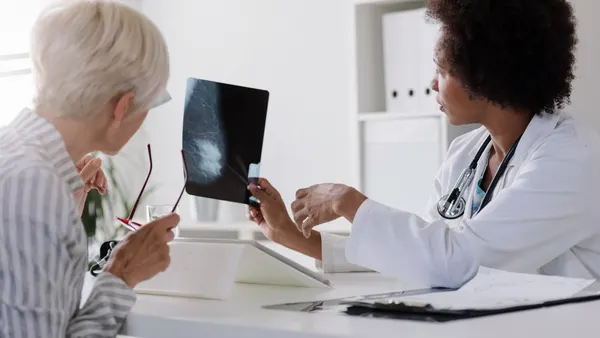Dive Brief:
- Johnson & Johnson said Thursday it is collaborating with Apple to study the role of wearables in improving early detection of atrial fibrillation, an arrhythmia that can cause stroke, blood clots, heart failure and other life-threatening complications. The multi-year, randomized controlled U.S. research program will launch later in 2019.
- In particular, J&J is investigating if a new heart health engagement app it developed can expedite diagnosis and improve health outcomes in individuals 65 or older who receive irregular rhythm notifications from their Apple Watch, thanks to the device's built-in electrocardiogram. Notably, FDA warned when granting a De Novo clearance that the Apple Watch EKG App is not intended for diagnosis, and is not recommended for patients with other known arrhythmias.
- Apple is also reportedly in talks with certain Medicare plans about making the devices more widely available to seniors. While the EKG notifications stand out as having high potential for elderly users, the device has other senior-appropriate features like fall risk detection.
Dive Insight:
Atrial fibrillation has been a key target of wearable devices as they've grown in the health space. The potential market is big, with nearly 130,000 deaths and 750,000 hospitalizations in the U.S. annually.
AliveCor's Kardiaband in 2017 became the first FDA-cleared medical device add-on for the Apple Watch. Clinical data has shown that wearable EKG's detect heartbeat irregularities about as well as traditional implantable loop recorders.
The American Heart Association says that at least 2.7 million Americans live with AF, but many are unaware they have the high-risk condition. J&J contends that if more people are aware of their condition, more physicians can be looped in and adverse events can be better prevented.
J&J is the the latest medtech company to jump on the Apple Watch train. Zimmer Biomet announced in October it would study the device's use in assisting patients before and after knee and hip replacement surgery in conjunction with the mymobility app, which connects patients with their surgical teams.
The impending 2019 study builds off research published by J&J with the Scripps Translational Science Institute last year that showed heightened AF detection and treatment instigation among EKG wearers. J&J said that AF could just be the tip of the iceberg for risk detection by wearable devices.
"Based on the insights generated through this research program, we may be able to develop new ways to detect other health conditions earlier in the future that also exhibit measurable physiological symptoms," said Paul Stoffels, chief scientific officer at J&J in a statement.
While large medtechs seem eager to partner with Apple, the interest appears mutual as Apple forges deeper into healthcare. CNBC reported in December that Apple has at least 40 medical doctors across its staff, and CEO Tim Cook said earlier this month that the company's "greatest contribution to mankind" will be its health services.













